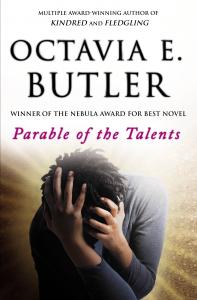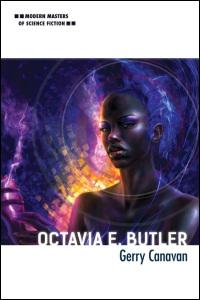This post is a continuation of yesterday’s theme of “Orwell, Atwood, Butler: Reading for Resistance & Resilience in the Age of Trump” about a three-part book discussion series on “Reading for Resistance & Resilience.” This sentiment is echoed in the central discussion question for our third piece of fiction Octavia Butler’s Parable of the Talents: What lessons might  we learn from a novel published in 1998—almost twenty years ago—in which a populist, authoritarian zealot is elected President of the United States using the campaign slogan “Make American Great Again”? The New Yorker calls her book prescient.
we learn from a novel published in 1998—almost twenty years ago—in which a populist, authoritarian zealot is elected President of the United States using the campaign slogan “Make American Great Again”? The New Yorker calls her book prescient.
Tragically, Butler is unable to speak for herself because she died in 2006 from a fall near her home at the far too young age of 58. But she is on the record in a brilliant speech at MIT from around the time Parable of the Talents was published saying, “This was not a book about prophecy; this was an if-this-goes-on story. This was a cautionary tale, although people have told me it was prophecy. All I have to say to that is, ‘I certainly hope not.’”
As Gerry Canavan details in his excellent book about Octavia E. Butler for the “Modern Masters of Science Fiction” series from University of Illinois Press, when Butler calls her novel an “if-this-goes-on story, she is explicitly referring to some of the worst trends of the Reagan era: greed, selfishness, war-mongering, race-baiting, and skepticism toward science (110). I should hasten to add, however, that Butler was interested not only in dystopian cautionary tales, but also in the utopian imagination. To build a better world, we first have to dream “what might be.” And Octavia Butler is a fascinating example of someone who lived deeply within that tension between dystopian realism and utopian hope. To explore some of what we might learn from her writings and worldview, let me tell you a little more about her life.
Octavia Butler was born in 1947 in Pasadena, California. She was only a toddler when her father died, and was raised primarily by her grandmother and her mother, who was a housecleaner. Butler confesses to sometimes feeling ashamed of her mother, but she came to see her mother quite differently. In Butler’s words: “I didn’t have to leave school when I was ten, I never missed a meal, always had a roof over my head, because my mother was willing to do demeaning work.” Indeed, commentators have noted that, “Many of Butler’s most-beloved heroines would be women quite like her mother, women who struggled and compromised, not because they were ‘frightened or timid or cowards’ but who made the best of no-win situations because ‘they were heroes.’” And although her mother did not understand her daughter’s aspiration to be a professional writer, she nevertheless scraped together the money to buy Octavia her first typewriter and to fund attendance at her first science fiction writers’ workshop (14).
And although Butler wrote stories from a very young age, her call to write science fiction came when she was twelve years old, and saw a mediocre film titled Devil Girl from Mars. She later said:
As I was watching this film, I had a series of revelations. The first was that, “Geez, I can write a better story than that.” And then I thought, “Gee, anybody can write a better story than that.” And my third thought was the clincher: “Somebody got paid for writing that awful story.” So I was off and writing, and a year later I was busy submitting terrible pieces of fiction to innocent magazines. (15)
But it was a long journey from being a young African-American girl in the racially-segregated 1950s, dreaming of being a professional writer, to winning the MacArthur Foundation “genius grant” almost four decades later in 1995 (141).
 As you can perhaps guess, she was given some pretty racist advice along the way, but it is powerful to witness the ways she persevered in bringing her experience of being both black and a woman to a science fiction field that at the time was almost exclusively dominated by white men. To give you one example, when she was told that race was an unwelcome topic in a genre allegedly best suited for “escapism,” she asked about Star Wars: “Violence, kidnapping, and planetary destruction [are] all in good fun—but ‘the sight of a minority person? Too heavy? Too real?” (77).
As you can perhaps guess, she was given some pretty racist advice along the way, but it is powerful to witness the ways she persevered in bringing her experience of being both black and a woman to a science fiction field that at the time was almost exclusively dominated by white men. To give you one example, when she was told that race was an unwelcome topic in a genre allegedly best suited for “escapism,” she asked about Star Wars: “Violence, kidnapping, and planetary destruction [are] all in good fun—but ‘the sight of a minority person? Too heavy? Too real?” (77).
Her best-known novel is Kindred, which turns on the idea that time traveling can be a very different prospect for a person of color who might find themselves returning to a time of legalized enslavement (62-63). And some of you may have seen the news that director Ava Duvernay—known for directing Selma (2014), 13th (2016), and A Wrinkle in Time (2018)—has signed on to adapt for TV the first part of what may be Butler’s best work, her Lilith’s Brood trilogy. Those novels tell the story of “a black woman named Lilith who, 250 years after humanity nearly incinerates itself in a nuclear war, works with aliens to restart the human race — primarily by mixing with aliens. As you might expect, some other humans don’t take to the idea as quickly as Lilith” and therein lies the tale (5).
Regarding why science fiction matters beyond entertainment, Butler once wrote that,
We write about aliens because we can’t stop creating them out of each other. We want aliens to be real so that we are not alone in a universe that cares no more for us than it does for stones or suns or any other fragments of itself. And yet we are unable to get along with those aliens who are closest to us, those aliens who are of course ourselves. (174)
And part of what makes Butler’s writing so compelling is that she does not write naïve utopian dreams. Her experiences as woman in a sexist society and as a black person in a racist society deeply inform her speculations about what the future might hold. In her words, “I don’t write utopian science fiction because I don’t believe imperfect humans can form a perfect society” (120-121). Butler speculated that we humans might only choose solidarity across our differences in the face of extreme adversity (151).
In a similar vein, as I have been reflecting on the science fiction of Octavia Butler, I was reminded that we recently passed the fiftieth anniversary of a sermon from another dreamer: The Rev. Dr. Martin Luther King. Fifty years ago, Dr. King delivered his famous sermon, later published as “Where Do We Go from Here: Chaos or Community?” Some of our current leaders seem to know only how to lead us into chaos. But Dr. King, Octavia Butler, and so many other progressives called us in a different direction: toward beloved community. Within our spheres of influence, may we each do our part—individually and collectively—to turn our dreams of beloved community into deeds.
The Rev. Dr. Carl Gregg is a certified spiritual director, a D.Min. graduate of San Francisco Theological Seminary, and the minister of the Unitarian Universalist Congregation of Frederick, Maryland. Follow him on Facebook (facebook.com/carlgregg) and Twitter (@carlgregg).
Learn more about Unitarian Universalism: http://www.uua.org/beliefs/principles
















